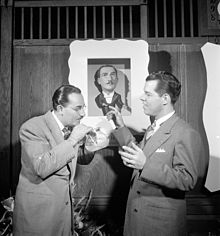Tex Beneke
| Tex Beneke | |
|---|---|

Shep Fields and Beneke, Glen Island Casino, New York, N.Y., May 16, 1947.
Photograph by William P. Gottlieb. |
|
| Background information | |
| Birth name | Gordon Lee Beneke |
| Born |
February 12, 1914 Fort Worth, Texas, US |
| Died | May 30, 2000 (aged 86) Costa Mesa, California, US |
| Genres | Big band, swing, jazz, blues |
| Occupation(s) | musician |
| Instruments | Saxophone, vocals |
| Associated acts |
Glenn Miller Orchestra The Modernaires Eydie Gorme Ronnie Deauville Henry Mancini Norman Leyden |
Gordon Lee "Tex" Beneke (February 12, 1914 – May 30, 2000) was an American saxophonist, singer, and bandleader. His career is a history of associations with bandleader Glenn Miller and former musicians and singers who worked with Miller. His band is also associated with the careers of Eydie Gorme, Henry Mancini and Ronnie Deauville. Beneke also solos on the recording the Glenn Miller Orchestra made of their popular song "In The Mood" and sings on another popular Glenn Miller recording, "Chattanooga Choo Choo". Jazz critic Will Friedwald considers Beneke to be one of the major blues singers who sang with the big bands of the early 1940s.
Beneke was born in Fort Worth, Texas. He started playing saxophone when he was nine, going from soprano to alto to tenor saxophones and staying with the latter. His first professional work was with bandleader Ben Young in 1935, but it was when he joined the Glenn Miller Orchestra three years later that his career hit its stride. Beneke said: "It seems that Gene Krupa had left the Goodman band and was forming his own first band. He was flying all over the country looking for new talent and he stopped at our ballroom one night [to listen to the Ben Young band]. [...] Gene wound up taking two or three of our boys with him back to New York. [Krupa] wanted to take [Beneke] but his sax section was already filled." Krupa knew that Glenn Miller was forming a band and recommended Beneke to Miller.
Whatever concerns Miller might have had about Beneke's playing were quickly dismissed; Miller immediately made Beneke his primary tenor sax soloist and Beneke played all but a few of the tenor solos on all of the records and personal appearances made by the Miller band until it disbanded in 1942. On the August 1, 1939, recording made of the Joe Garland composition "In The Mood", Beneke trades two-measure tenor solo exchanges with his fellow section-mate Al Klink. Miller's 1941 recording of "A String of Pearls" (composed by the band's arranger, Jerry Gray) also has Beneke and Klink trading two-measure tenor solo phrases. Beneke appears with Miller and his band in the films Sun Valley Serenade (1941) and Orchestra Wives (1942), both of which helped propel the singer/saxophonist to the top of the Metronome polls. Tex Beneke is listed in the personnel of the 1941 Metronome All-Star Band led by Benny Goodman. In 1942, Glenn Miller's orchestra won the first Gold Record ever awarded for "Chattanooga Choo Choo"; the song was written by Harry Warren and Mack Gordon as part of the score for the 1941 Twentieth Century Fox movie Sun Valley Serenade which was primarily made for the purpose of putting the Miller band in a motion picture. " Tex Beneke was the featured singer in the movie and on the Victor/Bluebird recording that also featured band vocalist Paula Kelly and the Modernaires, a vocal group of four male singers, who were also regular members of the Miller entourage. "Chattanooga Choo Choo", catalogue number Bluebird 11230-B, was recorded by the Miller band at the Victor recording studios in Hollywood, May 7, 1941. Hoping to repeat the success of "Chattanooga" the following year, songwriters Warren and Gordon composed "I've Got A Gal in Kalamazoo" for the "Orchestra Wives" score. That arrangement also featured Beneke, the Modernaires and band vocalist Marion Hutton in a not-too-dissimilar fashion. Not surprisingly, "Kalamazoo" became another hit record for Miller, Beneke and the band though not to the extent that "Chattanooga" had been the year before. By then, the U.S. was involved in World War II and "Kalamazoo's" success was also short-lived partially because Miller disbanded his group only three months after the record was made and four months following the filming of "Orchestra Wives".
...
Wikipedia
